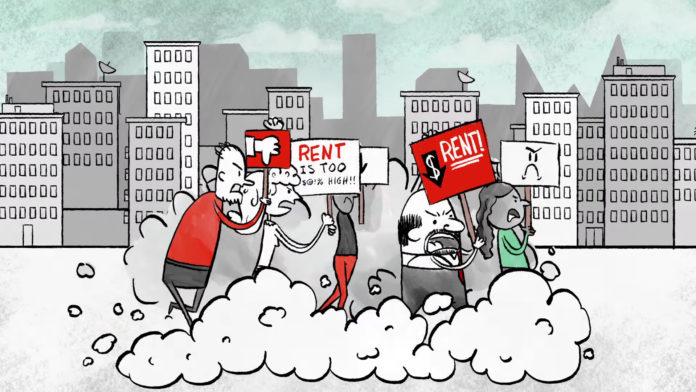Lawmakers are scrambling for affordable housing solutions for a region where rents have spiked more than 50 percent in the last decade and waits for public housing stretch over 10 years. “Rent control is not the answer to our housing crisis,” said one official from a neighboring community to Boston. “Governments don’t have a good track record of setting price controls that solve problems.”, she added.
State Rep. Mike Connolly, D-Somerville, announced plans to file a bill that would revisit the question of rent control, which has been banned statewide since a narrowly decided 1994 ballot initiative. “We’re facing an ongoing affordable housing emergency, and I certainly don’t think there’s any one silver bullet. I think we need a comprehensive program to guarantee housing for everyone — to treat housing as a human right,” Connolly said Tuesday on WGBH’s Boston Public Radio. “Certainly I think housing production is a big part of it, but also tenant protections, such as rent control provisions, as well as raising revenue and making public investments in housing and anti-homelessness measures.”
Rent control has been regaining popularity in states such as New York, California and Illinois, where residents are facing skyrocketing rents. Last month, Oregon became the first state to impose rent control, capping rent increases at 7 percent a year, plus inflation. Connolly’s bill, which has not yet been filed, would give cities and towns the power to impose annual caps on rents and eviction protections for tenants.
Landlords have one word to describe the effects of rent control: “disaster.” They maintain that imposing rent control would mean taking money out of the pockets of landlords, who raise rents to cover maintenance and other costs. They also maintain that they aren’t exempt from the squeeze of the housing crisis. Their solution to the area’s housing crisis is for government to work with developers to encourage and even pay for more affordable housing.
Tenants advocacy organizations are finding a new life, given the rising rents in the Greater Boston area. They are likely to find legions of middle-class tenants joining their rallies and calls for government action. It is no longer the cry of the poor and working poor. Massachusetts voters in 1994 narrowly voted to outlaw rent control, but advocates say the region’s housing crisis has become so severe that it is worth revisiting.
On the record, most elected officials are ‘mum’ on the topic, since the legislation has not been officially filed. Earlier this week, Governor Charlie Baker threw cold water on a push to restore rent control in Massachusetts, saying he worried it would do more harm than good. “Rent control will stifle the production of new housing,” Baker told reporters at an unrelated event in the Back Bay, according to the State House News Service. “That’s exactly the wrong direction we should go.” Baker’s comments followed a Globe story Tuesday about a bill soon to be filed in the Legislature by a group of progressive legislators that would let cities and towns to impose rent control — and implement other tenant protections.
The concept of rent control refers to the set of laws that places restrictions on the amount a landlord may charge a renter to occupy a unit. These rules can span everything from the timing and amount of a rent increase, to conditions that must be met to justify eviction.
Many historians believe Julius Caesar enacted a law stating a landlord could not charge more than the ancient Roman equivalent of $100 per year for a home in Rome. This came after a Roman senator appealed to the courts claiming his landlord tried to double his rent and he could no longer pay it. That said, the concept of rent control we’re familiar with today likely started sometime between World War I and World War II. It’s not uncommon to experience a housing shortage after a major war because of the decrease in new developments during the war combined with population growth and the number of U.S. soldiers returning from overseas, so that’s likely the culprit. To combat this, many countries started government-controlled housing that limited how much a landlord could charge. However, the U.S. didn’t immediately pass such a restriction on a federal level. The growing tension between public landlords and tenants, though, caused a few specific states and cities to implement laws of their own.
Eventually, the U.S. started a rent control policy, with the first ones starting in New York and Washington, D.C. These locations experienced significant housing shortages after the war, which led to public landlords taking advantage of tenants in a demand-heavy market, which then led to evictions, rent strikes and fear of revolt. Washington D.C. and four states — California, Maryland, New York and New Jersey — still have rent control laws.
This is an issue that is likely not going to go away quietly.










